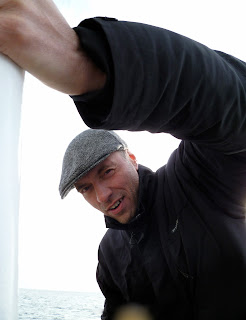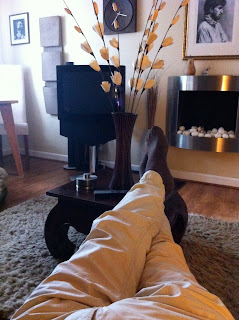It's the Diamond Jubilee weekend... Huzzah, or a big pile of crap? Well, many people in my Twitter timeline (lefty, liberal types) are republicans - either mildly or quite outspokenly so. Below is the reworking of a blog I did for another site at the time of the Royal Wedding in April, which sets out some of my thoughts.
The Jubilee Weekend
Just as with the Royal Wedding (which I didn't watch), I personally genuinely couldn't care too much about the Jubilee. I've nothing planned. I am aware of the historic significance: I still see Diamond Jubilee plaques etc from 1897: this is a big event in terms of our country - I've put bunting up on my cottage more for a more of camp fun than anything else.
‘Argh!’ scream the ranks of republicans, however: the Monarchy isn't harmless. It's illogical. It's patriarchal. It's about privilege. It is based on the hereditary principle, and worse still, it derives from the Divine Right. It has no place in a modern democracy. Yes. I agree on all of these except the first. No one would sit down and come up with this system. There is little to defend it from a modern, rational, purely democratic viewpoint. It is a product of evolution, accident and history - as are most things in our world.
A Dignified Figurehead
A Costly Institution
I'm not too sure that people are aware of the fact that George III entered into a rather bad deal (for the monarchy) upon his accession. He surrendered income from the Crown Estates to parliament in return for a payment known as the "civil list". This has proven to be a phenomenally good deal for "us" in the 250 years since then. We, the tax payers, support the monarchy and in return the state controls a property portfolio of over £7 billion, with an annual profit of around £250 million.
Just as with the Royal Wedding (which I didn't watch), I personally genuinely couldn't care too much about the Jubilee. I've nothing planned. I am aware of the historic significance: I still see Diamond Jubilee plaques etc from 1897: this is a big event in terms of our country - I've put bunting up on my cottage more for a more of camp fun than anything else.
 |
| £1 from the cheapo store in Diss: bargain! |
I am amazed, though, how many people (off Twitter) did love the Royal Wedding and how many people look like they will be celebrating this weekend. Good for them. Many irrational things in life give us pleasure: some people enjoy the environmental disaster that is Formula 1: I couldn't think of anything more boring. If Eurovision is a reason to bring your friends together and have a massive once a year celebration listening to people singing utter trash, enjoy it. I don't begrudge people having street parties or whatever else they're doing for the Jubilee: have fun.
The Hereditary Principle is Offensive
‘Argh!’ scream the ranks of republicans, however: the Monarchy isn't harmless. It's illogical. It's patriarchal. It's about privilege. It is based on the hereditary principle, and worse still, it derives from the Divine Right. It has no place in a modern democracy. Yes. I agree on all of these except the first. No one would sit down and come up with this system. There is little to defend it from a modern, rational, purely democratic viewpoint. It is a product of evolution, accident and history - as are most things in our world.
In a country that does not have 100% inheritance tax, a far from properly progressive income tax system, and private education, there is no question that people are born into positions of power, opportunity and privilege that will be reinforced during their childhoods. The Royals are the most obvious high-profile example of this, but they are by no means the only "offenders". There are plenty of undeserving people who inherit privilege and give an awful lot less back to society than (at least the core of) the Royal family with their public and charitable duties.
We are all the products, to some extent, of the accident of our births. This can be very unfair and I believe in society working towards reducing the effects of this. Do I believe, however, that "getting rid of the Windsors" would in any way make a meaningful, practical difference to social mobility and opportunity in this country? Absolutely not. It would be highly symbolic, but I really cannot see how anyone could argue that the population is more socially mobile in two comparable countries such as Finland and Sweden, just because one is a republic and one is a monarchy. It would not rid us of our class system, and do nothing to improve social opportunity, other than giving one person out of 60 million the opportunity to be voted in as president for one of more terms.
 |
| Prince Carl Philip: royally keeping Sweden's gays in eye candy |
This is of course brings us to the uncomfortable point, for Republicans, that some of the most successful countries in the world in human development terms are monarchies. Norway, Sweden, Denmark and the Netherlands are modern social democracies with Kings or Queens (7 of the top 10 "most developed nations" are in fact monarchies). I would infinitely rather live in them, than countless republics I could name (Russia, Brazil, China, Democratic Republic of Congo etc...).
Being a republic does not cure all ills, nor of course does being a monarchy solve them (Bahrain is a particularly vile example of a monarchy: there are others). The reality is that there are numerous other factors: the constitutional arrangements regarding who is head of state frequently has absolutely no bearing on matters whatsoever.
A Dignified Figurehead
There are of course very real practical advantages to a having someone such as our Queen as head of state, over an elected or appointed president. I believe that the Queen has, in the past 60 years, provided this country with a dignified figurehead, who has shown herself to be completely above party politics. The monarchy provides stability, continuum, a focus. The Queen (and indeed the Prince of Wales) are respected around the world and represent our country phenomenally well. Ask people whom they associate with the United Kingdom and the Queen will be pretty high up the list.
Even when the President of the US greets the Queen, you know he is a passing figure: she will remain. She represents us powerfully and with dignity: no president of a country of 60 million could pack the punch that she does.
 |
| The 11th US President during her reign: she has personally met 10 |
There are few people I would want to see in practical terms as our Head of State. What are the alternatives: an elected president with political power: a President Sarkozy or President Cameron? An ex-politician such as a President Major or Blair? Or a grey figurehead president (no matter how worthy) that no one has heard of abroad: a Joachim Gauck or Micheline Calmy-Rey? Who? Exactly.
A Costly Institution
I'm not too sure that people are aware of the fact that George III entered into a rather bad deal (for the monarchy) upon his accession. He surrendered income from the Crown Estates to parliament in return for a payment known as the "civil list". This has proven to be a phenomenally good deal for "us" in the 250 years since then. We, the tax payers, support the monarchy and in return the state controls a property portfolio of over £7 billion, with an annual profit of around £250 million.
The latest figures I can find suggest the monarchy as a whole cost us £38.2 million in 2009/10 (click for link). The cost of the UK monarchy was therefore around 63p, per person, per year. This is a literally a drop in the ocean in terms of state expenditure. When you consider the deal with the £250 million profit from the Crown Estates, another, even more positive picture emerges.
Don’t of course pretend presidents do not cost money too: perhaps not as much if they are symbolic figureheads with a lesser public profile, but they are still far from free to the taxpayer. The "costly institution" argument of Republicans seems to hold little water from what I can tell.
Tourism
The tourism argument goes both ways. Monarchists claim the Queen brings people to Britain. Republicans point out that just as many people visit Paris as London. I don't know if there's proper research on this, but it seems to me quite obvious that people will visit wherever they want, regardless of whether there is a monarch there or not. I don't avoid Rome because they got rid of the Savoys, and I don't visit Copenhagen expecting to bump into Queen Margrethe.
 |
| The last Emperor and Empress of Austria |
What I will say, though, is that when you visit somewhere like the Hofburg in Vienna you visit an empty, soulless, uninhabited place. On a purely emotional level the whole magic has gone. This was the home of the most powerful family in Europe for centuries: the seat of the Holy Roman Emperors. No, of course they shouldn't be exercising political power in 2012, but there is something sad, crushing and depressing about the tacky "Empress Sisi" chocolates and Made in China souvenir watches on sale in the palace and the millions of visitors filing through.
The grandson of the last Emperor, HIRH Karl, Archduke of Austria, worked as a TV game show host during the 1980s (incidentally at the same time Nazi officer Kurt Waldheim, with his alleged SS connections, was President of the Austrian Republic). Is this something Austrians as a nation are proud of? I wouldn't be.
The Harm Test
I've accepted few people would devise a system of monarchy in 2012. Like many things in life, however, no matter how flawed it might be in theory, it really does work in practice.
There is an obvious trap in mixing up the personality of any of them with the way the institution functions: you might of course not like any of the Windsors as individuals, but that is not a convincing an argument for making a long-lasting change to the whole 1500 year old institution.
Given the British Monarchy has been around for so long, I would suggest we really do need to apply a "does it cause actual harm" test in considering removing it, as well as the obvious "how to replace it" question. I genuinely cannot see the practical argument for instituting massive, fundamental constitutional change and abolishing the Monarchy. With its almost total absence of practical political power, it harms no one in practice. Nor can I see a good alternative.
There really are many, many changes I would like to see take place in our society. I think they deserve our efforts far more than what I see as a sixth-form style dogmatic position of "attacking" the Monarchy from a purely theoretical stance.
 |
| Magical, beautiful - and completely soulless, empty Schönbrunn |
It's Only When It's Gone
I frequently visit the empty palaces of Versailles, Schönbrunn and Potsdam because of my part time job leading educational tours around Europe. I grew up in the Federal Republic of Germany. Having grown up with direct experience of both countries, I can really say it's sometimes only when you’ve lost something that you truly appreciate its worth.
I think I'm what you would term a "Lazy Monarchist" - I'm not all rah, rah, rah about it... but I do support it, and I do wish you a Happy Diamond Jubilee if you are celebrating it.
If however you're a strident Republican and are going to sit around and be all miserable all weekend, here's a thought to cheer you up > It's only ten years until the Platinum Jubilee.... Just *think* how big that one is going to be :-)
















































